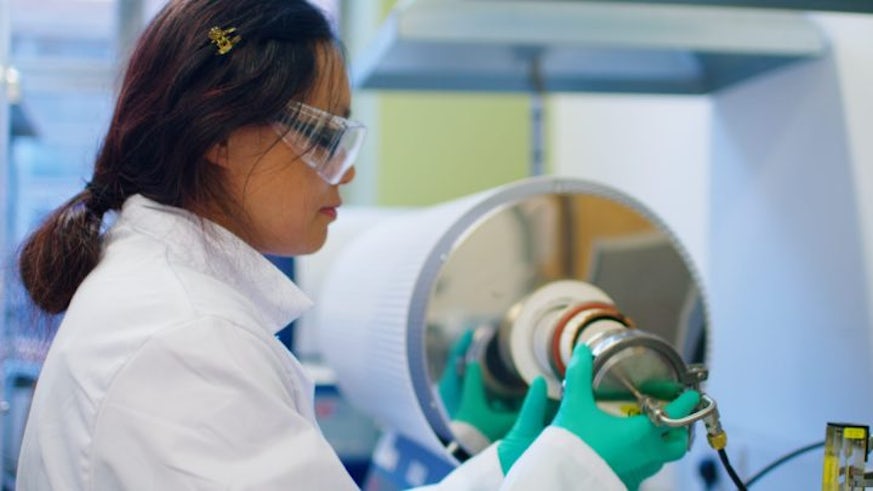University expertise backs UK’s first ‘hydrogen ecosystem’
5 August 2022

Cardiff University researchers are supporting a bid to develop the UK’s first ‘Hydrogen Ecosystem.’
South West England and South Wales are teaming up to lead the development of low carbon energy to help reach climate change goals.
The Western Gateway partnership alongside the GW4 Alliance have unveiled a new strategy and interactive online map highlighting organisations across the area already working on potential uses for hydrogen.
The gas is the most abundant element in the universe which has long been suggested as a potential energy solution to help the world decarbonise.
It is currently being trialled as a potential low carbon energy source to power transport, distribution and shipping needs as well as heat our homes and decarbonise industry.
Using hydrogen as an energy source has been highlighted as a key part of the UK Government plans to reach Net Zero with the deployment of up to 10GW of low carbon hydrogen production capacity by 2030.
From the Milford Haven Energy Kingdom to Swindon’s Hydrogen Hub, businesses, industries, universities, research organisations and local authorities across South Wales and the South West are leading the way in developing potential uses for the natural resource.

The Western Gateway Partnership represents the economic powerhouse of South Wales and Western England whilst the GW4 Alliance brings together the universities of Bath, Bristol, Cardiff and Exeter. Both are working together to convene expertise from across the region to improve collaboration, share solutions and raise awareness of the local capacity and R&D excellence on a global stage to attract investment.
Professor Roger Whitaker, Pro Vice-Chancellor for Research, Innovation and Enterprise at Cardiff, said: “Cardiff University’s research groups are playing an exceptional role in shaping the hydrogen ecosystem. They are investigating the use of hydrogen as a fuel, either directly or as a feedstock for conversion to ammonia in a number of projects. Examples of our expertise include investigating the use of green ammonia, the development of ammonia and hydrogen fuelled gas turbines, internal combustion engines, furnaces and drones, fundamental research and development of plasmas and injection systems, and hydrogen/ammonia blends as fuels for HGVs, trains, as well as aeroplanes and ocean-going vessels.”
Cardiff also leads the DragonFLY project from the newly established Hydrogen Electric Propulsion Research Centre at St Athan. Its main aim is to develop a scalable technology demonstrator to prove the concept of a hydrogen electric hybrid propulsion system. The project integrates two novel advanced battery and hydrogen fuel cell systems on a single platform to overcome the main barriers faced by the industry and test its performance capabilities on a regional scale flying testbed. The project is partially funded by eight industrial partners, the European Regional Development Fund (ERDF), and Welsh Government.
The University heads up the FLEXIS consortium of five strategic partners including Swansea University, University of South Wales, Neath Port Talbot Borough Council and Tata Steel UK. With £24 million of funding, including a portion from the European Regional Development Fund via the Welsh Government, the vision of the five-year project is to achieve a resilient, affordable, secure energy system across Wales with the potential for global application.
Robert Buckland MP, Secretary of State for Wales, said: “South Wales and Western England are already leading the way in developing Hydrogen as a clean fuel to help the world decarbonise to reach Net Zero. Through the Western Gateway Partnership, this new Hydrogen Ecosystem is helping to bring together the best of what these areas have to offer across the wide range of potential uses and helping to supercharge this work to meet the challenges we face”.
Katherine Bennett CBE, Chair of the Western Gateway Partnership, said: “The Western Gateway has been leading the way in developing hydrogen as a clean energy source to power our future economy. Hydrogen could provide a solution for many of the persistent challenges we face in trying to decarbonise our global energy system.
“By launching this new Hydrogen Ecosystem, our partnership is creating a mechanism to encourage collaboration across industry to ensure we are turbocharging the development of this clean energy to bring it to the market. We want to send the message that investing in the Western Gateway area gives you access to the wide range of industries and avenues to international trade needed to bring hydrogen use into the mainstream.”
